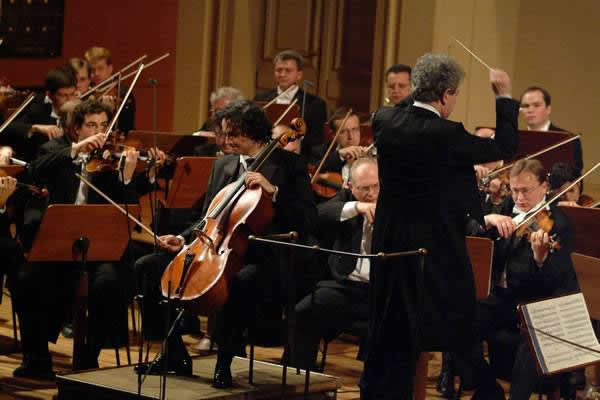Tribute to Antonín Dvořák 2004
The most ambitious project Tribute to Antonín Dvořák 2004 took place from 30 April
to 2 May 2004 commemorating the 100th anniversary of Dvořák´s death by a wide range of events: a commemorative mass, six concerts and
two unique exhibitions of Dvořák´s scores.
The highlight of the project was the concert
Dvořák the Cosmopolitan
featuring the best known pieces, Symphony No. 9 "From the New World" and the Cello Concerto in B minor,
performed by outstanding Czech artists - the Czech PO, conductor
Jiří Bělohlávek and cellist
Jiří Bárta.
length of programme: 90 minutes
format: HD, digi beta

Antonín Dvořák (1841 – 1904) lived to receive an exceptional world-wide admiration. His work was played mostly in England, where he was invited nine times and was awarded an Honorary Doctorate by the University of Cambridge (1891). He was very successful in Germany and Austria as well. The peek of the career of the Czech composer was the invitation to the United States to become director of the Conservatory in New York (1892-95). During his stay in the States Dvořák composed his two most often performed pieces, the New World Symphony (1893) and the Cello Concerto (1895). Both compositions have been performed by tens of ensembles and musicians all over the world. The concert offered the most authentic presentation by the Czech Philharmonic Orchestra under the baton of the internationally acclaimed Jiří Bělohlávek. The young cellist Jiří Bárta chose a new approach to the famous composition.
director: Adam Rezek
Antonín Dvořák:
Slavonic Dances, selection
Slavonic Rhapsody No. 3 in A flat major
Solemn March
Prague Radio Symphony Orchestra
conductor: Vladimír Válek
Antonín Dvořák was proud of his being Czech but he was also able to get inspiration from all over the world. In many of his pieces he took inspiration from the wide Slavic territory. The best know composition of the kind are the Slavonic Dances (the first eight of them, Op. 48, date back to 1878, the second eight dances, Op. 72, were finished in 1887). They include the Russian Dumka, Polish Polonaise, the South Slavonic Roudn Dance as well as Czech dances. The original version was composed for piano four hands, Dvořák soon arranged them for orchestra. In 1878 Dvořák composed three Slavonic Rhapsodies. The third one of them, in A flat major, attracts us by its romantic sound and excellent arrangement. The Solemn March dates back to the same period (1879). All these compositions abound in melodiousness, inventive and sometimes fiery arrangement and impressive rhythm. The Prague Radio Symphony Orchestra conducted by its chief conductor Vladimír Válek let all the qualities of Dvořák´s music sound fully.
director: Stanislav Vaněk